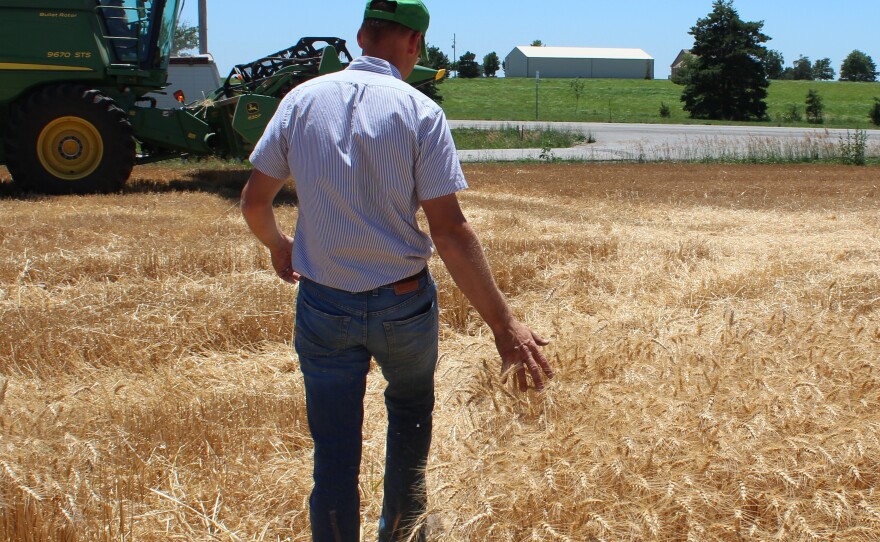Farmers work at the mercy of three big forces that are largely outside their control, the weather, the markets, and the government.
In many parts of the country the first two are doing pretty well these days, but government remains the wild card. Congress can’t seem to pass the farm bill, a huge package of legislation setting food policy for years to come.
The wheels may have come off the farm bill, but out in Kansas actual farming is going full tilt. Steven Kalb, a young man with a green cap, stands surveying a golden wheat field near Baldwin City, Kan. He looks pretty happy.
This wheat does look good. It’s a complete reversal from last year, when drought killed corn and soybeans around here. And this grain is as valuable as it is abundant. Wheat prices are nearly double what they were just a few years ago. So, right now the weather and markets are the least of Kalb’s worries.
“I feel the government is the least trustworthy of the three probably,” says Kalb. “The market, through the year will give us opportunity. Far as the weather, we can’t control it, but we can conserve what she give us."
Congress regulates food policy with the farm bill. About 80 percent of it goes for food subsidies for low-income people through programs like SNAP and WIC.
Then, there are programs designed to keep farmers in business, and the food coming. That’s money for subsidized crop insurance, agricultural research and conservation, among other things.
The farm bill’s collapse in the House last week throws all this into limbo.
Kermit Kalb, Stephen’s dad, seems pretty sanguine about the political impasse.
“Washington’s a long way from here,” says Kalb from the cab of his combine. “And, we heard the bill failed, but there’s not much we can do about it.”
Something similar happened last year. The House couldn’t pass a farm bill, the old one expired, and congress patched it with a one-year extension.
Kalb is resigned to the uncertainty over farm policy. The one thing that bugs him about not having a new farm bill, is that the old one preserves direct payments to farmers, payments he receives every year, whether he needs them or not.
“Somebody’s got to pay that,” says Kalb. “You know, and that’s not fair.”
Direct Payments are a hold-over from a 1990s plan intended to wean farmers off subsidies. They were supposed be temporary. Stephen Kalb says they pay farm land owners each year, regardless of need.
“You just kind of walk into the farm service agency and say I’m a farmer and I farm this piece of ground,” explains Kalb. “And they say here’s the payment for that farm.”
That is just what is happening at the county Farm Service Agency in Lawrence, Kan. John Alley is up against a deadline to process requests for Direct Payments.
“This is one of our busiest times of year,” says Alley.
If last year’s farm bill had passed Alley wouldn’t have to bother. It would have ended direct payments, saving billions of dollars a year. That’s something most farmers agree with, but it didn’t pass.
The House farm bill would have enhanced crop insurance, and expanded coverage to crops that are hard to insure under the program now. That was a sticking point for some environmentally-minded congressmen, and fiscal conservatives.
The bill might have passed over those objections, though, if not for a dispute over the size of cuts to low income food programs. Mike Shultz, who farms near Brewster, Kan. thinks farmers would do better if congress considered farm subsidies on their own, separate from nutrition assistance.
“Those of us that work are getting tired of fitting the bill,” says Shultz of nutrition programs. “I’m for decoupling the deal."
Tom Vilsack, the U.S. Secretary of Agriculture says splitting consideration of nutrition programs away from the agriculture-oriented parts of the farm bill would hurt farmers.
“If that were to happen it would be difficult potentially to get the kind of support for rural programs that we currently get,” says Vilsack.
He says divorcing SNAP from Ag policy would bust up the rural/urban coalition that’s passed generations of farm bills, even as rural populations dwindle, and lose political clout-- clout farmers may wish they had the next time the climate, crop prices, or the mood in Washington turns against them.






